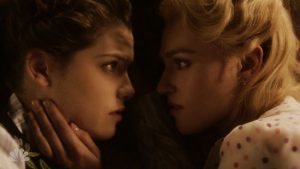
Perhaps one of Sigmund Freud’s most critiqued assertions was the sexual distinction between men and women. Namely, all of women’s desires could be traced back to some aspect most carnal. His conviction was so strong that it even seeped its way into works such as Creative Writers and Day-Dreaming.
“[Motivating forces] are either ambitious wishes, which serve to elevate the subject’s personality; or they are erotic ones. In young women the erotic wishes predominate almost exclusively, for their ambition is as a rule absorbed by erotic trends” (423).
Aside from cringing, what do we do with this? I will focus on the beginning chapters of Dracula to analyze Freud under the contexts of classic literature of his day (both because I find Dracula endlessly fascinating, as well as the fact that there simply are no women in The Island of Dr. Moreau).
Firstly, we have Lucy Westenra, best friend of Mina Harker. Lucy struggles with the very first-world problem of having three male suitors vying for her hand in marriage. Lucy struggles immensely with the power that choosing a husband gives her; “Three proposals in one day! Isn’t it awful!” (64). Lucy does not know how to choose a husband, nor does she seem to want to. She laments, “Why can’t they let a girl marry three men, or as many as want her, and save all this trouble?” (67). This seems to follow Freud’s point; here we have a woman who does not have the ambition to marry in a way that will best suit her (or marry none of them if that would be the best scenario).
What diverges from Freud is seen in Lucy’s motives. Lucy does not seem to register that marrying three men would also imply a sexual attachment to all of them. Lucy is a dreamer; she wants to marry for love, like Mina has. She even mentions to Mr. Morris, “Yes, there is one I love, though he has not told me yet that he even loves me” (67) and seems to be quite sincere in her belief about the way to pick a spouse. Lucy is not thinking about sex and does not seem to even view it as the most prudent aspect of marriage.
Dracula often makes quite explicit feelings of a sexual nature. For example, Jonathan Harker feels “in [his] heart a wicked, burning desire that [the women of Dracula’s castle] would kiss [him] with those red lips” (45). It is purposeful that Lucy is so pure and unaware of sexuality, and at the same time a woman with desires that do not dip beneath the surface of love and loyalty, seeking protection from a man, is a direct contrast to Freud and his claims.
I also think that it is important to note that when as Lucy transforms into a vampire, the process allows her sexual desires to awaken, and she repeatedly tries to draw Arthur close to her so he can embrace her, even before she officially becomes a vampire: “In a sort of sleep-waking, vague, unconscious way she opened her eyes…soft voluptuous voice…’Oh, my love, I am so glad you have come! Kiss me!'” (172). This scene is repeated once her transformation was completed: “…with outstretched arms and a wanton smile…’Come to me, Arthur. Leave these others and come to me. My arms are hungry for you'”(226). Her newfound sexual desire is seen as another unholy and dangerous trait bestowed upon her because she was infected and changed by Dracula, and the men repeatedly refer to her condition as an unfortunate loss of purity.